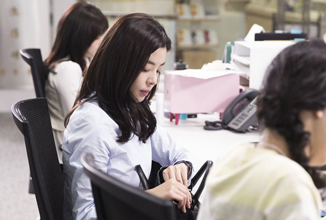"Did you ever really love mum? I mean, you never fancied her all that much..."
Synopsis:
While his wife, Jin-kyung (Kim Ho-jeong), has been bravely fighting a (sadly) losing battle against brain cancer, Oh Sang-moo (Ahn Sung-ki) has increasingly faced a mental struggle of his own; his difficulty in balancing his wish (even need) to do everything he possibly can to ease his wife's physical and psychological pain with his many responsibilities as the manager of a cosmetics company turns almost his every move into as much an act of contrition as a definitive step in one direction or another.
The arrival at his company of new employee Eun-joo (Kim Gyoo-ri) frays Sang-moo's mind yet further and, try as he might, he finds himself unable to refrain from fantasising about a sexual relationship with the beautiful, effervescent young woman.
However, on subsequently giving her a glowing work recommendation the opportunity arises for Sang-moo to perhaps shift his fantasy about Eun-joo closer to reality; his mind soon becoming a battlefield of convention versus desire...
Review:
Throughout his long and illustrious career, director Im Kwon-taek has made the contrast between traditionalism and modernity in Korea and Korean society inherent to many of his (currently) 102 films; whether setting timelines during periods of great change (historically) in Korea where the march of modernisation increasingly squeezes traditional beliefs and values almost to almost nonexistence ('Sopyonje', for example); detailing the suffering historically of women/feminism and the male/female balance in what was long a patriarchal society ('Surrogate Mother'); or using a present day narrative to show the survival of traditional arts (and indeed values) in an altogether more modern world ('Hanji' etc).
Not only that, but Im Kwon-taek has regularly used specific characters to stand as either the personification of Korea's past or its present - their individual character arcs standing for those societal shifts - and with 'Revivre' taking place in contemporary Korea, that is very much the case here, too.
'Revivre' (based on the story 'Hwa-jang' written by Kim Hoon) begins with what at first appears to be a typically historical Korean scene, prior to the film's present day setting being shown: Sang-moo leads a group of mourners, all dressed in traditional black Buddhist robes, carrying his deceased wife in a carriage to her final resting place. Everything looks as it traditionally should, all the characters fit perfectly in this seeming picture from a Korea long passed, and it is only when Sang-moo looks behind him to the funeral entourage that the surreal nature of this (soon to be realised) dream sequence becomes apparent. For within the sea of traditional, sombre black dress, Sang-moo's gaze focuses on beautiful young woman Eun-joo dressed in brightly coloured, contemporary clothing; her character looking every bit as out of place in this traditional setting as the ill ease with which modernity subconsciously sits within the mind of this traditional man whose dream we are watching, Sang-moo. Whether you take this early scene and Sang-moo's individual character arc - subsequent from viewers' perspective but in flashback in terms of actual timeline - as a statement of his yearning to step away from the grinding responsibilities and claustrophobic expectations placed upon him by traditional values (as a man moving from middle-age towards the twilight years of life and, as such, having grown up in a time when traditionalism was instilled from youth to adulthood) by way of his desire to embrace modernity (psychologically) and its personification, Eun-joo, (physically); look at it as a foreshadowing of the desperate subconscious need of an aging man (with prostate problems) to prove his virility and show he's as much a man with sexual desires as he was before life began taking his very manhood away; or see it an implication of his awareness (and guilt) of how society as a whole, and his family and peers specifically, would distastefully view someone of his age thinking sexually of a young girl, the underlying statement is the same: Here we have a man who is neither comfortable in the traditional world he came from nor in the modern world his lust for Eun-joo is leading him towards, to the extent that one way or another something will have to give.
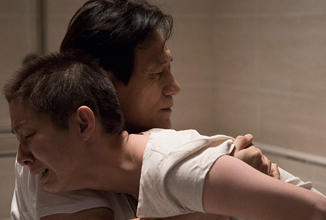 |
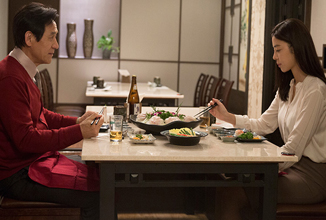 |
Following the early narrative dream sequence, we are briefly brought to the present day before stepping back in time to watch the unfolding of events that have led to Sang-moo's current situation: His wife is suffering from terminal cancer, Sang-moo has ongoing male medical problems and he is desperately trying to keep some semblance of normality in his life while trying to balance the increasing needs of his spouse with the pressures of his job. His insistence on taking care of Jin-kyung's every cancer related problem - from shaving her head to cleaning her when she soils herself, and beyond - could equally be said to be an undertaking of traditional spousal requirements/responsibilities and an - again old school - effort to spare his wife the humiliation and embarrassment of having strangers (i.e. hospital staff) deal with her extremely intimate bodily issues, but the one thing it isn't, to my mind, is a desire to do whatever is necessary out of love for a soulmate.
In fact, at a somewhat later stage in proceedings, Sang-moo's daughter even asks "Did you ever really love mum? I mean, you never fancied her all that much" and as such his growing infatuation and increasing sexual desire for Eun-joo becomes all the more believable, in spite of standing as a psychological betrayal of sorts of the lifelong commitment he made to Jin-kyung. Not only that, but this statement/quotation in itself also stands as the very core of Revivre's culminating theme; that our feelings about others (and our related perceptions of ourselves) are wholly influenced, altered or even created by our knowledge, or lack thereof, of how others see and feel about us.
That idea can be seen too (certainly for a time, at least) in Sang-moo's perceptions of Eun-joo; as she gradually appears more willing to be involved in Sang-moo's life his thoughts move from fantasies of her naked and reclining - an almost erotic picture being looked upon from afar - to imaginings of physically making love to her (when in reality he is having sex with his ailing wife), and in the process his self perception shifts from an ageing individual, largely past his sell-by date dreaming of what he feels could never truly be, to an older man who nonetheless remains vibrant and virile enough to perhaps still be attractive to the opposite (and younger) sex.
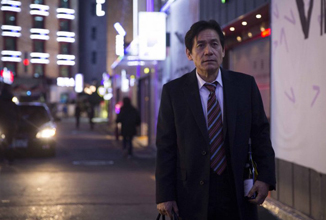 |
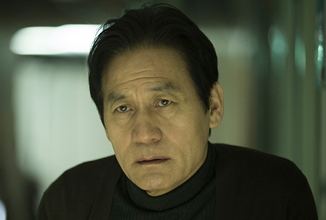 |
That said, I do have somewhat of an issue with the supposedly burgeoning relationship between Eun-joo and Sang-moo, in terms of Eun-joo's motivations: From Eun-joo's perspective, Sang-moo (seemingly, at least) appears largely as only a friendly enough work superior/father figure who has listened (almost in passing) to her comments about her engagement and its break-up and who deserves thanks for writing her a glowing employment recommendation, but whether that would be anywhere near enough to push her towards allowing or wanting the relationship to become far more serious, or indeed ultimately lead to her sending intimately pleading messages ("Why won't you answer my calls? I really need to see you!" etc) is far more questionable. Even if you were to assume that Eun-joo's feelings towards Sang-moo are entirely friend-based, innocent and even naive (in stark contrast to his thoughts about her) her desperate, even needy, pleas late in proceedings would still be rather overkill, once more undermining the believability of their relationship. All in all, personally, I feel this side of 'Revivre' would have been greatly strengthened by keeping the implied growing relationship between Sang-moo and Eun-joo solely in Sang-moo's mind as a sexual fantasy rather than attempting to imply its crossing over into (questionable) reality.
In spite of the above issue (and I am aware it's my personal issue as much as if not more so than anyone else's), 'Revivre' is a deeply powerful film; the strongest element of all being the relationship between Sang-moo and his dying wife, Jin-kyung, in the midst of her losing battle against cancer:
The physical pain of Jin-kyung's condition and the psychological turmoil of both her as victim and Sang-moo as carer (each increasingly helpless in their respective roles) are palpable to the nth degree; bringing both poignancy and indeed heartbreak to almost their every interaction and considering the fact that Sang-moo's sexual desire for Eun-joo grows almost in tandem with Jin-kyung's illness each scene is subtly laced with an undercurrent of (Sang-moo's) guilt over feelings he knows he should ignore but which he cannot refrain from indulging in, even to the extent of dreaming of making love to Eun-joo while he is having sex with a cancer ravaged Jin-kyung.
In fact, Im Kwon-taek deftly uses nudity to contrast the two (real and imagined) relationships in Sang-moo's increasingly complex and confused life - Eun-joo repeatedly pictured in sumptuous, warm colours, her nakedness always shown in an erotic context; while Jin-kyung's nudity is (like her life) laced with constant pain and embarrassment, whether being stripped at the toilet after soiling herself so that Sang-moo can clean her or indeed nude in spite of her terrible illness in order to have sex with her husband (while he imagines being with the much younger, physically perfect Eun-joo). It could even be said that the huge contrast in the nature and context of each woman's nudity - as seen by Sang-moo - plays its role in pushing him further towards making his (ever beautiful) sexual dreams of Eun-joo a reality… but that is, I admit, largely conjecture on my part.
The conclusion of ‘Revivre’ is as nuanced as it is simple and as deft as one would expect from exemplary director Im Kwon-taek, but it is a tiny moment slightly earlier in proceedings that remains as the final, resonating word: Though Sang-moo has spent virtually his entire character arc in confusion and claustrophobic turmoil, it is a seemingly inconsequential discovery made in his late wife's belongings that ultimately tells him everything he needs to know.
Summary:
Im Kwon-taek's 'Revivre' is a powerful story of a man, whose wife is terminally ill, who begins to fantasise about a sexual relationship with a much younger woman. Deftly contrasting traditionalism and modernity within the characters themselves, Revivre's strengths ultimately lie in the painful, poignant realism on show, in spite of one rather questionable character motivation.
Cast:
Anh Sung-ki, Kim Gyoo-ri, Kim Ho-jeong
'Revivre' (화장) / 2014 / directed by Im Kwon-taek
|



